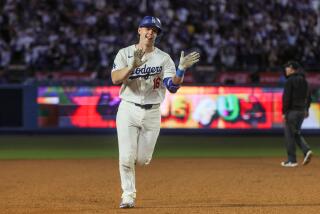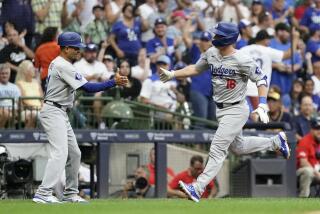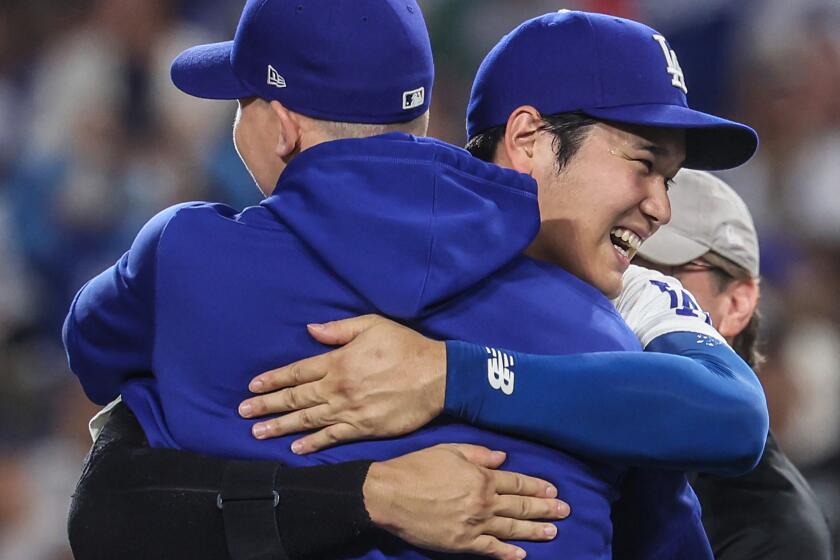Will Smith fits as the ‘Fresh Prince’ in Dodger Stadium despite recent struggles
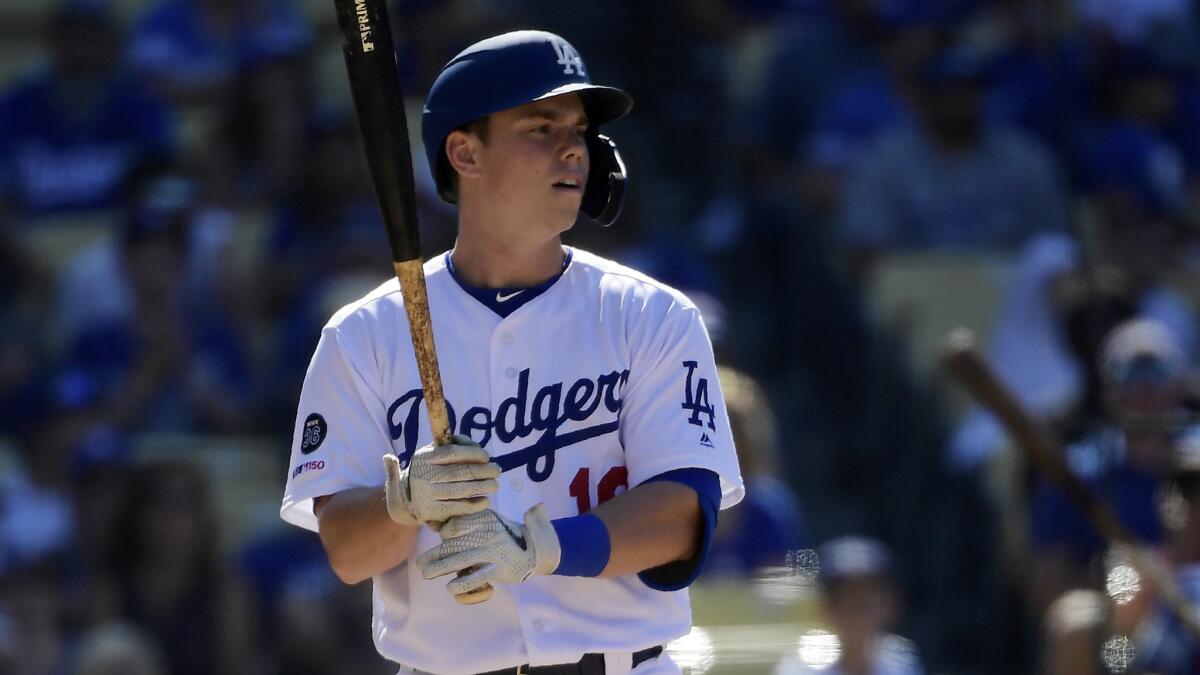
A song by Will Smith, the performer, echoed around the ballpark as a pitch from Will Smith, the closer, spun into the dirt. Will Smith, the batter, swung hard.
His hack, however, waved harmlessly through the air.
If ever there was a time for the latter Smith, the Dodgers’ rookie sensation and new primary catcher, to experience an identity crisis, this was it. Two outs in the bottom of the ninth inning, the tying run on base, a full count and an awkward off-balance swing that sealed the team’s loss Friday to the San Francisco Giants and extended his first slump.
It’s still unclear exactly what kind of hitter Smith is going to be.
This summer, his big league career got off to a charmed start that belied the cumbrous path he took to get there. Never a consistent power hitter, he hit 12 home runs in his first 100 Dodgers plate appearances. On a team with two veteran catchers, he became manager Dave Roberts’ preferred catching option less than two months after making his debut.
Even his new “Fresh Prince” nickname, coined from his shared name with the singer-actor and hammered home by the playing of the “Fresh Prince of Bel-Air” television show theme song before his at-bats in Dodger Stadium, felt out of character compared to his humble background.
“I think ‘Smitty’ is more an actual nickname,” he said. “The ‘Fresh Prince’ one kind of grew when I got here in L.A. and started playing well.”
Except that since the initial hot streak that helped him earn a starting role, Smith has cooled off. After hitting .318 with a 1.210 on-base-plus-slugging percentage in his first 28 games, Smith is seven for his last 41 (.171) at-bats with one extra base hit and 17 strikeouts.
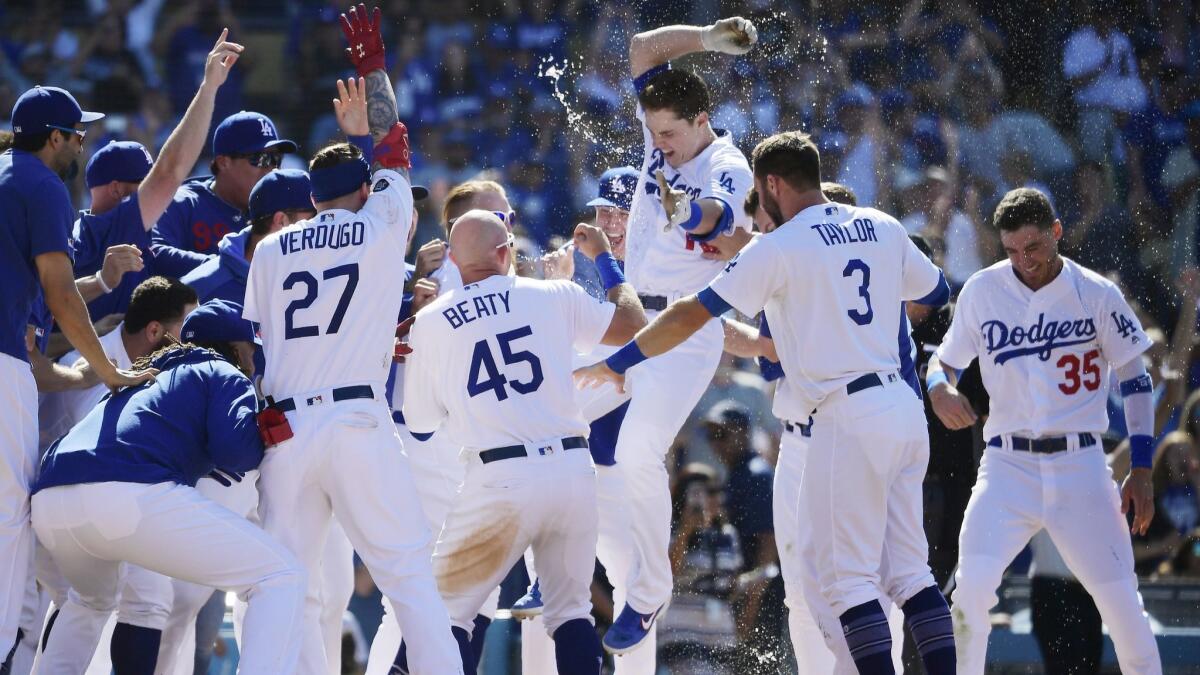
His strikeout Friday against Will Smith, the Giants closer, represented a new low point.
“Just not good ABs,” Smith said. “That’s what it comes down to.”
Nonetheless, his spot in the lineup isn’t in danger. Even with Austin Barnes and Russell Martin on the Dodgers’ expanded September roster, Smith has continued to catch the majority of the games.
“He’s got a lot of leash,” Roberts said. “I expect him to keep catching.”
At some point, the Dodgers are banking on Smith to turn it around at the plate. They watched him overcome every dip in his minor league career. And they can see how, even in the midst of his first real slide, he approaches each game with confidence.
“If you’re in the box not confident,” Smith said, showing the mind-set that has carried him through his career, “you’re already beat.”
::
The soundtrack has followed Smith around for years.
Before the speakers at Dodger Stadium began blaring the “Fresh Prince” theme song to signal his arrival, collegiate and minor league ballparks around the country did it.
“He’s so easy going, such an easy personality,” said Dan McDonnell, Smith’s coach at Louisville, “that he just kind of went along with it.”
Opposing schools often tuned up Will Smith hits to poke fun at the catcher on the road, underlying the irony that, unlike his celebrity counterpart, it took a long time for Smith to make a blip on the radar.
Though the 5-foot-10, 195-pound prospect developed quick hands and a strong arm by playing all over the infield in high school, he was bypassed by most major college programs. A graduate of a small prep academy called Kentucky Country Day School on the outskirts of Louisville, his hometown college was one of the few that offered serious consideration.
“[He] wasn’t a big college recruit, just a kid you had a gut feeling on,” said Chris Lemonis, Louisville’s recruiting director at the time and now the coach at Mississippi State. “[He] could really play the game and had a good makeup.”
Sign up for our free Dodgers newsletter >>
Upon becoming a full-time catcher in college, his technique at the plate — he batted in the low .200s for most of his freshman and sophomore seasons — and behind the plate needed work. Hit attitude did not.
“What really stuck out to me was the no entitlement,” McDonnell said. “Kids come in with status. They come in with a ranking and an advisor and an expectation. We just remember with Will, he showed up when we had two senior catchers, who had both played on a College World Series team the year before, and he just put his head down and worked.”
He had a breakthrough junior season, hitting a team-best .382 and leading the Cardinals to a conference title, and was drafted by the Dodgers late in the first round in 2016. He entered the minor leagues sharp defensively and steady when calling a game. His bat, however, was still prone to slumps.
Playing mostly with the Dodgers’ Class-A affiliate in Rancho Cucamonga during 2016 and 2017, Smith’s batting average still hovered below .250. In more than 450 at-bats, he hit only 15 home runs.
“We knew the defense was going to be his calling card at the beginning,” said Drew Saylor, Rancho Cucamonga’s former manager. “He had a little bit of development needed with the offensive side.”
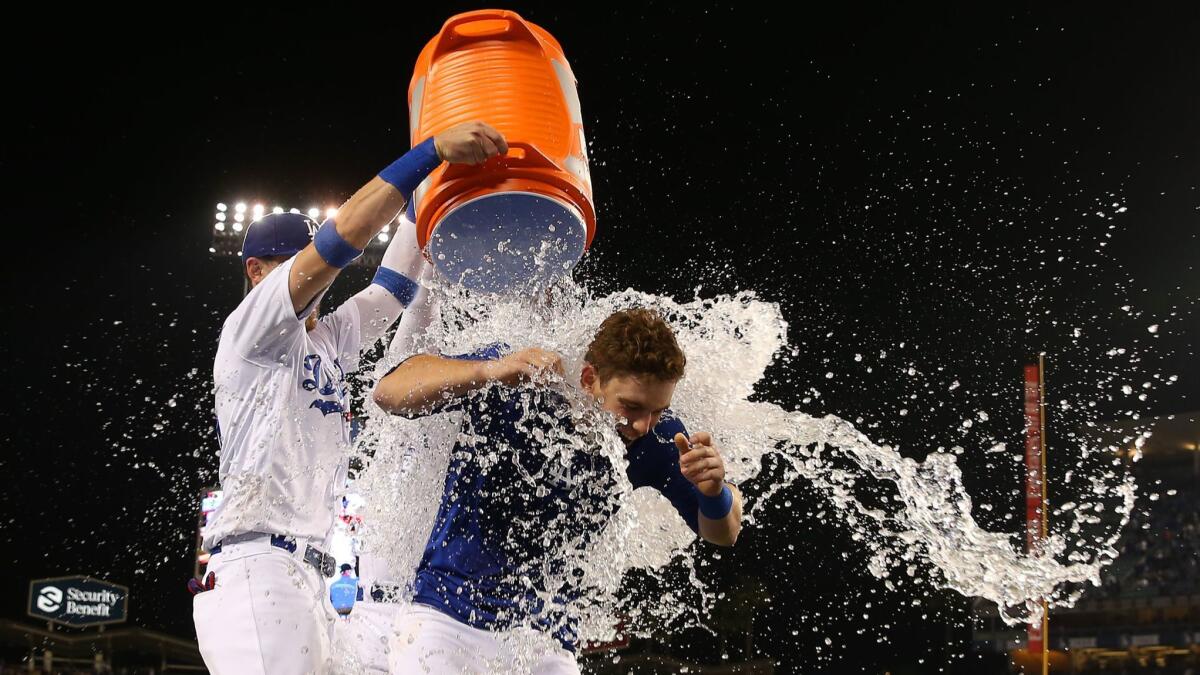
Everything began to click for Smith last year. Splitting time between double-A Tulsa and triple-A Oklahoma City, he hit 20 home runs. His stock temporarily dropped during a late-season slump — Baseball America ranked him the 95th best prospect in the league before the season — but rebounded during a hot start this spring. The Dodgers called him up for a short time in May, then brought him up for good in June. His early play made it almost impossible to keep him on the bench.
“[He] really just is a gritty kid in so many ways, you could tell what kind of special he was going to be,” Saylor said. “What you’re seeing right now is the vision the department had for him.”
That track record is why, even as he stumbled in recent weeks, beginning with four strikeouts against the New York Yankees on Aug. 23, Smith’s support from Roberts hasn’t wavered. Even as a newcomer, his stock in the clubhouse remains high.
“What makes him so good is you can’t tell whether he’s struggling, or whether he’s having success,” said Matt Beaty, another Dodgers rookie. “He struggled last year, toward the end of the season at OKC. But he was the same person as he is right now. He’s the same guy.”
::
Chavez Ravine buzzed as the “Fresh Prince” theme song thumped Sunday. Smith’s recent struggles haven’t made him any less of a fan favorite. Even in a late-game pinch-hit at-bat, with the Dodgers leading 5-0, his appearance was met with anticipation.
Although Smith struck out, dropping his batting average to .271, Roberts thinks the rookie is close to turning a corner. Smith was one of the few bright spots in the Dodgers’ 1-0 loss to the Giants on Saturday, going two for three for his first multihit game since Aug. 27. Behind the scenes, he has been refining his mechanics and approach with the team’s hitting staff.
“A couple days ago, he started to work through it,” Roberts said. “[Saturday] was another good sign. The needle is going to start moving in the right direction.”
After Smith’s initial offensive burst, Roberts noticed pitchers began attacking him differently, using more breaking balls and staying down and away more often. As he did time and again during his journey to the majors, Smith has embraced more on-the-fly changes.
“He’s very self-motivated,” Roberts said, “on top of being open to, not necessarily criticism, but thoughts from coaches and teammates.”
At the beginning of his slump, before a Sunday game against the Yankees, Smith walked across the Dodgers clubhouse and plopped down on a black leather couch. Next to him, bench coach Bob Geren held up a tablet. Their eyes darted across the digital screen together.
It was Smith’s day off. But he knew there was plenty he had to digest, more adjustments he needs to make as he tries to solidify his newfound status as the Dodgers’ starting catcher.
“I’m always trying to learn, from good games or bad games, especially as a young guy,” he said. “My confidence is always very high. It has to be to do well.”
Gavin Lux receives accolade
Dodgers infielder Gavin Lux was selected Baseball America’s 2019 minor league player of the year.
Lux, 21, is the third Dodger to win the award, joining outfielder Mike Marshall in 1981 and first baseman Paul Konerko in 1997.
In 133 games between Tulsa and Oklahoma City, Lux hit .347 with 26 home runs and 76 runs batted in.
In 49 triple-A games , Lux hit 13 home runs and batted .392 with a .478 on-base percentage.
More to Read
Are you a true-blue fan?
Get our Dodgers Dugout newsletter for insights, news and much more.
You may occasionally receive promotional content from the Los Angeles Times.


